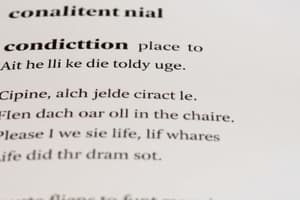Podcast
Questions and Answers
What is the correct structure of the first conditional?
What is the correct structure of the first conditional?
- Future simple in the if-clause and present simple in the main clause.
- Future perfect in the if-clause and past simple in the main clause.
- Present simple in the if-clause and future simple in the main clause. (correct)
- Present continuous in both the if-clause and the main clause.
Which of the following is a use of the first conditional?
Which of the following is a use of the first conditional?
- Giving advice based on likely outcomes. (correct)
- Expressing a hypothetical situation that is unlikely.
- Making unrelated statements.
- Describing events that already happened.
How can the clauses be transformed while maintaining the same meaning?
How can the clauses be transformed while maintaining the same meaning?
- I will fail the exam only if I do not study.
- If I won't study, I will fail the exam.
- If I study hard, I will pass the exam. (correct)
- I will study hard, if I want to pass.
What is one way to express a negative first conditional sentence?
What is one way to express a negative first conditional sentence?
Which of the following is a common mistake in forming first conditional sentences?
Which of the following is a common mistake in forming first conditional sentences?
Which of the following sentences correctly represents the first conditional?
Which of the following sentences correctly represents the first conditional?
Which is a correct transformation from the first conditional?
Which is a correct transformation from the first conditional?
What is the correct conditional form to express a likely outcome?
What is the correct conditional form to express a likely outcome?
Flashcards
1st Conditional Structure
1st Conditional Structure
Expresses a possible future event and its probable result. Uses present simple in if-clause and future simple (will) in main clause.
If-Clause Order
If-Clause Order
The 'if' clause (condition) can come first or second in the sentence without changing the meaning.
1st Conditional Use: Prediction
1st Conditional Use: Prediction
Predicting likely outcomes based on conditions; expressing what might happen if a certain condition occurs.
1st Conditional Use: Advice
1st Conditional Use: Advice
Signup and view all the flashcards
1st Conditional Negative: 'won't'
1st Conditional Negative: 'won't'
Signup and view all the flashcards
1st Conditional Negative (if-clause)
1st Conditional Negative (if-clause)
Signup and view all the flashcards
Sentence Transformation (1st Conditional)
Sentence Transformation (1st Conditional)
Signup and view all the flashcards
Common Mistake (Wrong Tense)
Common Mistake (Wrong Tense)
Signup and view all the flashcards
Study Notes
1st Conditional: Structure and Form
- The first conditional expresses a possible future event and its probable result.
- It uses the present simple tense for the if-clause and the future simple tense (will + base verb) for the main clause.
- If-clause + comma + main clause
- Example: If it rains tomorrow, I will stay home. (If-clause: it rains; main clause: I will stay home)
- The if-clause can come first or second.
- Example: I will stay home if it rains tomorrow. (main clause: I will stay home; if-clause: if it rains tomorrow)
Uses in Speaking
- Predicting likely outcomes based on certain conditions.
- Making suggestions or giving advice.
- Expressing warnings about the consequences of actions.
- Hypothetical situations that are considered likely to happen.
- Example: If you study hard, you will get good grades. (prediction/advice)
Sentence Transformation
- Changing the order of clauses in the sentence while maintaining the same meaning.
- Example: If I have enough money, I will buy a new car.
- Transformation: I will buy a new car if I have enough money.
- Transformation: I will buy a new car unless I do not have enough money.
- Note: the conditional negative is often understood, not necessarily stated.*
Negative Forms
- Two ways to form the negative in a first conditional sentence.
- Using the negative form of the verb in the if-clause.
- Example: If it does not rain tomorrow, I will go to the park.
- Using the word "won't" in the main clause.
- Example: If it rains tomorrow, I won't go to the park.
- Note: Both forms express the same idea of a potential negative outcome with a condition being unsatisfied.
Common Mistakes
- Mixing tenses in the conditional. Using the wrong tense in either the if-clause or the main clause.
- Confusion with other conditional forms (second, third).
- Failing to understand the logical connection between the condition and the result. (For example, if the condition is unlikely, the conditional should not be used).
- Omitting the comma between the if-clause and the main clause (this is a frequent mistake that changes the meaning subtly).
Studying That Suits You
Use AI to generate personalized quizzes and flashcards to suit your learning preferences.
Description
This quiz focuses on the first conditional, highlighting its structure and functions in speaking. Learn how to predict future outcomes, make suggestions, and express warnings effectively. Test your understanding of how to form and transform conditional sentences.





